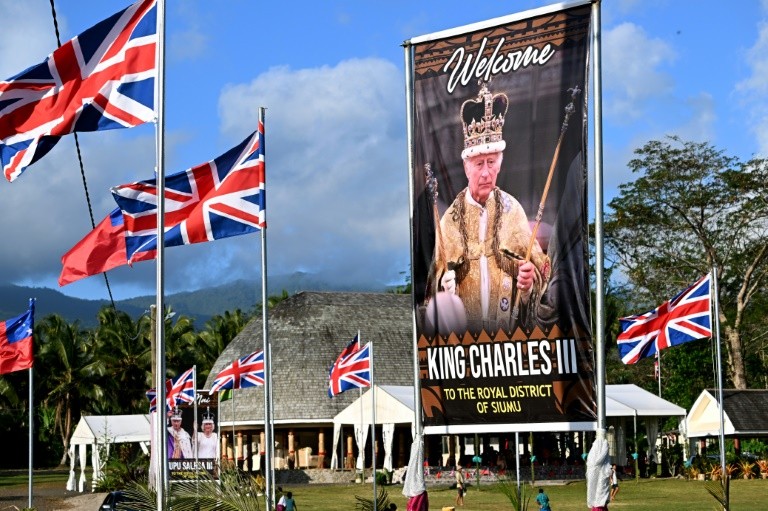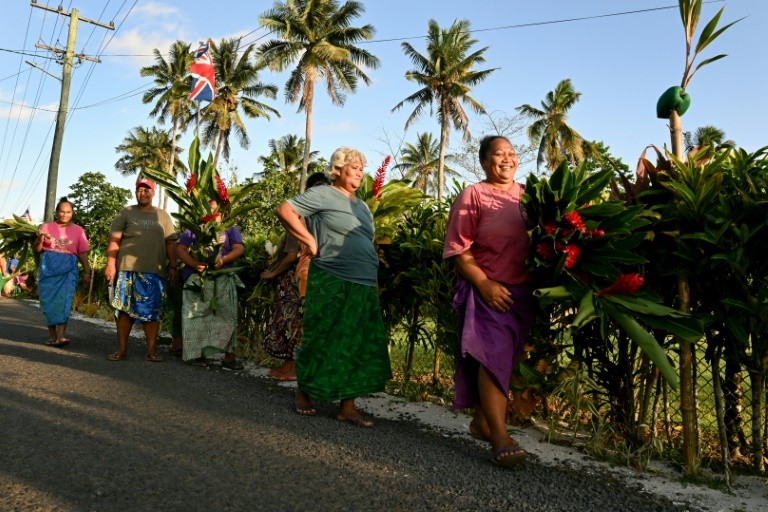
King Charles III landed in Samoa Wednesday to join his first Commonwealth summit as monarch, hoping to breathe new life into a bloc seen by critics as "a leftover of empire".
Charles arrived in the coastal capital of Apia -- halfway between New Zealand and Hawaii -- after a six-day visit to Australia that was slimmed down following his cancer diagnosis earlier this year.
The biennial meeting of the 56-nation grouping -- mostly former British colonies -- will attract around 3,000 delegates.
The conference is the first hosted by a Pacific Island nation and will be an "extraordinary" opportunity to showcase the region, Commonwealth Secretary-General Patricia Scotland told AFP.
Scotland hopes the summit will "cement" the Commonwealth family "as we look to what, for many, is a very troubled and complex future".
"We have two choices globally. We can either swim together or we can drown separately," she said.
"The Commonwealth has never been for drowning. It's always been for fighting."
Climate change and rising sea levels are expected to feature heavily on the agenda.
There is no place like the Pacific nations to better highlight this "existential threat", Scotland said.
Once seen as the embodiment of palm-fringed paradise, the South Pacific is now one of the most climate-threatened pockets of the planet.
About 70 percent of Samoa's population lives in low-lying coastal areas.
The country has spent months preparing for the summit, including renovating hotels and running a two-month scheme to compensate illegal gun owners who surrender their firearms, an effort to ensure the safety of world leaders and summit attendees.
Samoan resident Mata'afa Keni Lesa told AFP he was "very excited" to show off "the best of our Samoan hospitality".
While some critics question the relevance of the Commonwealth in a post-colonial era and say it is "a leftover of empire", Scotland said this was far from true.
The last two countries to join the Commonwealth in 2022 -- Gabon and Togo -- were former French colonies.
King Charles, who leads the Commonwealth, said in Canberra on Monday that the bloc played a "significant role" on the world stage.
"It has the diversity to understand the world's problems, and the sheer brain power and resolve to formulate practical solutions," he said.
The summit also provides countries with an opportunity to meet without being overshadowed by "geostrategic anxiety or competition", said Tess Newton Cain of Griffith University's Asia Institute.
"There is no question that the tension and competition between the US and China plays out in Commonwealth counties," she said.
"I imagine there is a bit of relief that the US and China aren't there throwing their weight around."
Nonetheless, the legacy of empire will loom over the summit, in particular when leaders select a new secretary-general nominated from an African country -- in line with regional rotations of the position.
All three likely candidates to succeed Scotland have called publicly for reparations for slavery and colonialism.
One of the three, Joshua Setipa from Lesotho, told AFP that a resolution that goes beyond a "narrow perspective of financial compensation" was needed.
Instead, countries could be given funding to help them adapt and build resilience to climate change, said Setipa, who is vying for the post with rival candidates Shirley Ayorkor Botchwey from Ghana and Mamadou Tangara from the Gambia.
"We can find a solution that will begin to address some injustices of the past and put them in the context happening around us today," he said.
"This should not be seen as a north and south issue -- there is collective interest in discussing this and collective gains to be had."









